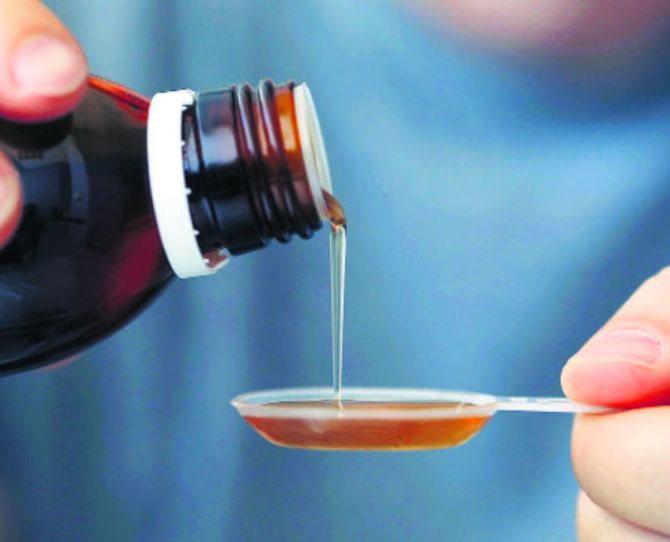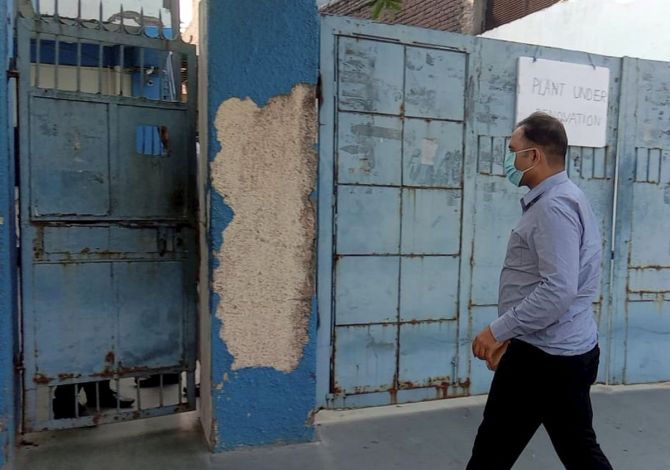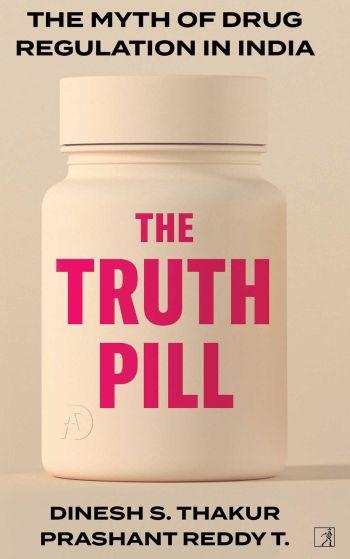'The deaths of the children in the Gambia would batter India's reputation as the developing world's pharmacy.'

Chemical engineer Dinesh S Thakur and lawyer Prashant Reddy T have long been demanding reform in the drug regulatory system in India.
Thakur and Reddy have come together to write a detailed book The Truth Pill- the Myth of Drug Regulation in India which helps explain why a tragedy such as the one in the Gambia could occur resulting in the death of 70 children.
In this joint interview, they explain what steps the government should take to introduce better drug regulation practices.
"R&D is a high-risk business and Indian promoters don't have the appetite for risk, especially when there is easy money to make by manufacturing generic drugs," Dinesh S Thakur and Prashant Reddy T tells Rediff.com Senior Contributor Rashme Sehgal.
We have witnessed a major tragedy in the Gambia where 70 children lost their lives drinking cough syrup manufactured by an Indian pharma company. Why was such a toxic syrup allowed to be manufactured in the first place?
The most likely reason for the contaminated syrup reaching the market is that the manufacturer did not conduct the mandatory tests required by law while using industrial solvents to make syrups.
It is well known that these solvents supplied by chemical traders to pharmaceutical companies can be contaminated which is why the law requires mandatory testing of the solvents to ascertain if they are contaminated with DEG -- which is an anti-freeze agent that can be fatal to humans -- before they are used in the manufacture of syrups.
Are there no regulatory checks and balances for drugs being exported from India and if so, how did this cough syrup escape the scrutiny of our regulatory bodies especially since several African nations are too poor to have testing facilities in place?
Drugs being exported outside India are not subject to any additional checks by the Indian regulator.
At most, foreign countries like the US may send their inspectors to certify when Indian facilities are in compliance with American law before permitting such facilities to export to the US.
Many African countries lack the resources to conduct similar inspections.
As for the Indian regulators, they are not required under the law to inspect each and every batch.
At most, they have an obligation to ensure that the manufacturing facility complies with the Good Manufacturing Practices (GMP) code that is part of Indian regulatory law.
The company named by WHO responsible for the tragedy in the Gambia stands accused by several state regulators in India of manufacturing substandard drugs.
That should have been a red flag for the Indian regulators to scrutinize the company more closely. For whatever reason, such heightened scrutiny never took place.

A probe has been initiated by India's drug regulator after WHO issued an alert saying cough syrups manufactured by the Indian firm could potentially be linked to the death of children in the Gambia. Photograph: PTI Photo
Drug industry experts say our pharma industry is rife with data fraud, inadequate testing and substandard manufacturing practices. Can you cite examples of this and how regularly is this taking place?
The foundation of modern drug regulation is adherence to the GMP code and at the heart of the GMP code is documentation of all manufacturing practices -- be it equipment cleaning schedules or testing procedures for releasing a batch of the drug to the market.
Strict adherence to the GMP code will ensure quality drugs in the market.
However, as shown in a number of cases, Indian companies have a cavalier approach towards documentation and GMPs.
In the less dangerous cases, the drug simply will not work; while in the more dangerous cases like the one in the Gambia or the five previous DEG mass poisoning cases in India, people end up dying.
More often than not, it is children who die in the case of contaminated cough syrup.
India has created a niche for itself and prides itself in being called the world's pharmacy providing a whole host of cheaper generic drugs. How would these deaths in Gambia affect our reputation?
Well, we presume that the deaths of the children in the Gambia would batter India's reputation as the developing world's pharmacy.
Most countries are unlikely to forgive the deaths of innocent children.
It does not help that the Government of India has not accepted that the deaths have taken place due to the contaminated cough syrup from India. Denial appears to be the official strategy.
Katherine Eban's book Bottle of Lies focused on Indian pharma not making quality products. This is a very serious allegation because medicine affects the lives of every Indian.
Katherine's book does a thorough job of exposing the Indian pharmaceutical industry's criminal approach to the issue of medicine quality. But her focus was only on Indian pharmaceutical companies exporting to the United States.
The state of pharmaceutical companies catering primarily to the Indian market is far scarier for reasons we document in our book The Truth Pill - the Myth of Drug Regulation in India.
Regulatory bodies complain of lack of funding. There also seems to be political interference.
Lack of funding is not the problem. A lack of political will and competency of the bureaucracy is the far greater problem.
As of today, the political and bureaucratic classes are more invested in the growth of the pharmaceutical industry than they are in the public health of the Indian people.
What kind of action do you see taking place against the Haryana drug company that made this cough syrup?
A similar incident occurred when nine children died in J&K drinking a cough syrup in 2019 which was manufactured in Himachal Pradesh.
As of now, the Government of India is yet to accept that the deaths in Gambia are attributable to the contaminated cough syrup made by an Indian company.
A lot is going to depend upon an ongoing parliamentary investigation taking place in Gambia and whether they do a thorough job of documenting the evidence required to causally link the adulterated cough syrup to the deaths of 70+ children.
Even if that investigation does establish the link, we suspect the Indian government will not accept the final results given the reputational risk for the Indian drug industry.
When the 11 children in J&K died in 2019, there was hardly an outcry in the country --from what we know, the government is yet to prosecute the manufacturer.
These are legally complex cases and unless there is political commitment to protecting public health, we are unlikely to see a successful conviction in court.
Your book The Truth Pill looks at regulatory lacunae existing in our country. Can you elaborate on some of these? Can you also suggest some immediate steps that the government should take to overcome this lacunae?
One simple and cost-effective solution is to ensure far greater transparency in how the regulator functions.
For example, the government can publish on the Internet all inspection reports, all test reports from government laboratories and make available more information about how it approves drugs.
This is the most obvious reform that will increase confidence in the Indian regulator.
A more complex reform is to centralise certain aspects of regulation such as licensing of manufacturing facilities.
Currently, each state licenses manufacturing facilities within their jurisdiction and that creates a complicated system wherein India has 38 drug regulators -- one for each state and Union Territory plus a central regulator. Too many cooks spoil the broth.

Indian pharma although a $50 billion industry has not succeeded in producing a single molecule. What are the bottlenecks?
Creating new drugs is very complicated.
It depends on many variables including the availability of capital, skills, and the ability to take an informed risk.
The failure rate is much higher when trying to develop a new chemical/biological drug compared to manufacturing copycat generics.
Also, the cycle time to discover and develop new drugs is often 5-10 times that taken to develop a generic formulation.
The management of most Indian pharmaceutical companies is happy enough to make money off generics.
They typically do not make investments in R&D required for creating new molecules.
As long as they can copy molecules from foreign innovator companies and work around patents, they won't be much pressure on them to create new molecules.
Why are some of our big pharma companies which are making huge profits not investing enough on R&D?
R&D is a high-risk business and Indian promoters don't have the appetite for risk, especially when there is easy money to make by manufacturing generic drugs.
In any case, our largest pharma company -- Sun Pharmaceuticals -- is tiny on the world stage. It has annual revenues of approximately $5 billion. On the other hand Pfizer had annual revenues of $81 billion for the last year.
There is not a single Indian pharmaceutical company in the top 10 pharma companies in the world.
We have successfully deluded ourselves into believing we are the pharmacy of the world -- at most we are the pharmacy of the developing world because of high volumes not high value.
The market for our generic drugs is based on the volume of what we produce, not the value of the products we make.
How should long-term finance be made available to Indian pharma?
Typically, nation-States invest in basic research and this is done with taxpayer funds.
A good example is how the National Institutes of Health functions in the US.
Once you have a viable drug candidate, the industry takes a leadership role.
While we have tried to replicate this model through CSIR (Council of Scientific and Industrial Research), our system is largely not focused, lacks competence and is littered with nepotism.
Unless we clean up the way we fund public research, this is a hard question to answer.
Overall, can you suggest two of three safety protocols that are a must?
For generic drugs, we need to mandate bioequivalence and stability testing. That is the bare minimum.
For new innovator drugs we need to ensure that these drugs are approved only after rigorous double-blind randomised clinical trials.
The emphasis should be on generating high-quality clinical evidence.
Most importantly, we need to encourage a culture of data integrity -- that is a problem across the board in India.
Feature Presentation: Rajesh Alva/Rediff.com










